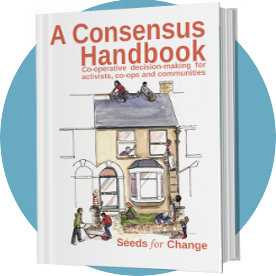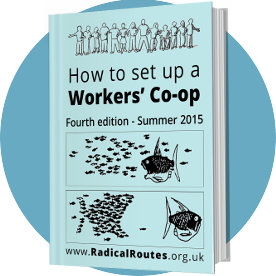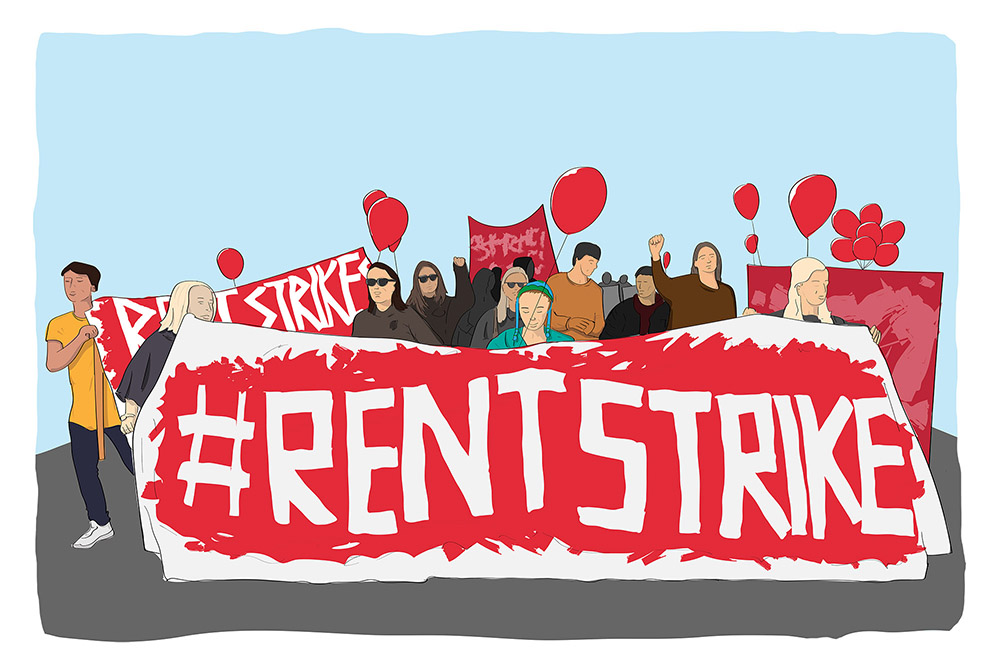Our guides are designed to help you be more effective in your campaign, co-op or project.
The ideas, examples and tips in our guides are based on working with many different groups and projects, both as campaigners and as trainers.
We've also linked to other resources you might find useful.
All Seeds for Change guides are anti-copyright. Feel free to copy, adapt, use and distribute them, as long as the final work remains anti-copyright. If you translate any of our work please let us know so that we can link to your translation.
Please feel free to get in touch with any feedback on our resources, including how you are using them.
This guide gives pointers for how create a strategic plan that gives you the
best chance of winning. It also includes more general tips on how to campaign effectively, including building a strong campaign group and generating the maximum pressure to achieve your campaign goals.
Web page | PDF - 1.2Mb
This guide explores how you can make campaign planning work as a group. It includes a suggested process for your meetings and a set of facilitation tools you can use to help you agree your aims, analyse your situation, come up with creative ideas, draw everything together in a plan and evaluate how it is working.
PDF - 954k
The right campaign message can increase understanding of an issue, win support for your goals and inspire people to action. It can also build towards the long-term goals needed to make radical change. In this guide you'll find ideas on how to develop a strategic message that gets across your analysis and values.
Web page | PDF - 805k
Publicity and outreach are essential for communicating campaign messages and getting people involved in taking action. In this guide you will find plenty of tips on how to best get your message across.
Web page | PDF - 368k
Having face to face conversations with members of the public is one of the most powerful ways you can reach outside your ‘bubble’ and build a stronger base for your campaign. This guide covers how you can use these techniques strategically, and develop the skills to be really effective.
Web page | PDF - 632k | Audio mp3 - 55MB
Using the media can help you win your campain. This guide covers the basics you need to know about getting your campaign message across in newspaper, radio and on tv.
Web page | PDF - 1.2Mb
Public meetings can be a great boost to your campaign by helping you reach people who aren’t already involved in your group. This guide will help you think through how to organise a public meeting in such a way that participants leave feeling empowered and motivated to join your campaign.
Web page | PDF 494k
A big part of organising events is looking for a good venue that is accessible to anyone who might want to come. This guide offers tip and check lists to help you choose and prepare venues to meet everyone’s access requirements. (For a facilitator's guide to access issues see Making Meetings Accessible).
Web page | PDF - 390k
An affinity group is a small, autonomous group of people who come together to take direct action. This guide covers how to create an affinity group, decide on your aims and tactics, and prepare for and take action. It offers tips for how to sustain your affinity group and deal with common problems that arise.
Web page | PDF - 1.4mb
A guide to getting money for your campaign.
Web page | PDF - 1.2Mb
To win, most campaigns need to grow! With more people more actively involved, you can increase your power and impact. This short guide offers practical tips and suggestions on how to attract and integrate new group members.
PDF - 346k
Direct action is a powerful tool that can be used to prevent injustice, win campaigns and achieve political goals. This guide explores direct action through recent successful examples in Britain, covering the tactics and roles involved, and analysing why the action was effective in its context. It will help you think through how direct action could work in your own context to achieve your goals.
Web page | PDF - 805k
Direct action can be a powerful political tool. This guide covers the key things to consider in order to plan and carry out an effective action: your strategy, how you will take care of yourselves as a group, practicalities like logistics and roles, and legal considerations.
Web page | PDF - 205k
An affinity group is a small, autonomous group of people who come together to take direct action. This guide covers how to create an affinity group, decide on your aims and tactics, and prepare for and take action. It offers tips for how to sustain your affinity group and deal with common problems that arise.
Web page | PDF - 1.4mb
A guide to using consensus in fast moving situations, including actions and protests.
Web page | PDF - 635k
Criminal convictions can impact a person’s life in different ways, and knowing these impacts can inform the decisions of you or your group when taking protest action. This guide helps you understand how criminal records work. It covers the impact of convictions on various areas of life for people in the UK, including employment, immigration status, housing and other areas.
Web page | PDF - 283k | Audio mp3
External resources:
Direct Action Handbook - Lots of ideas and info on taking direct action.
Delia Smith's Basic Guide to Blockading - lots of useful info, please note the legal info is out of date.
A guide to successful group organising, from starting up groups to keeping them going. With lots of tips, examples and questions to help you create a group that is inclusive and effective.
Web page | PDF
Decision making online comes with a lot of challenges - this guide outlines common dynamics and practical issues, and offers tips for how to do online decision making in a way that is democratic, easy to engage with and fun!
Web page | PDF - 530k | Audio mp3 - 31MB
Good meetings are vital to working together as a group, whether this is a campaign group, a self-development or support group. They can make all the difference between a group feeling motivated and dynamic or a group getting stuck.
Web page | PDF - 275k
Active listening is a useful skill for all sorts of situations - whether you're taking part in meetings and workshops or dealing with conflict. By actively listening we can come to understand how the speaker feels about a subject or situation - this briefing explains how we can hear people through their words and tune into their underlying emotions, concerns and tensions.
Web page | PDF - 325k
Sharing feedback regularly helps members of a group to develop skills, build stronger relationships, and be accountable to each other. This guide offers tips on how to give and receive feedback in a way that is most useful for you and your group. It is written for non-hierarchical groups, workplaces and educational settings.
Web page | PDF - 315k
To win, most campaigns need to grow! With more people more actively involved, you can increase your power and impact. This short guide offers practical tips and suggestions on how to attract and integrate new group members.
PDF - 346k
This 40 page booklet, written by our sister co-op Navigate (previously called Seeds for Change Oxford) and published by EYFA is aimed at people and groups working for social change who want to develop an understanding of conflict and how to deal with it. There are sections on what conflict is, the benefits of addressing it, and tools to work though conflict and maintain healthy and effective social change groups.
PDF - 315k
A guide to the questions a set of people needs to answer together in order form into a group, in a way that is engaging and empowering for everyone involved.
Web page | PDF - 1.7MB
Facilitation is about making meetings as easy and effective as possible. This guide offers tips, techniques and concepts to help you create positive and successful meetings. If you are facilitating for the first time, or you've been doing it for a while and want a chance to reflect - this guide is for you.
Short guide - Web page | PDF - 250k | Audio mp3
Long guide - Web page | PDF - 1.4MB
A compilation of tools and techniques we find useful when working in groups and facilitating meetings or workshops.
Web page | PDF - 1.4Mb
Good meetings are vital to working together as a group, whether this is a campaign group, a self-development or support group. They can make all the difference between a group feeling motivated and dynamic or a group getting stuck.
Web page | PDF - 275k
Decision making online comes with a lot of challenges - this guide outlines common dynamics and practical issues, and offers tips for how to do online decision making in a way that is democratic, easy to engage with and fun!
Web page | PDF - 300k
Active listening is a useful skill for all sorts of situations - whether you're taking part in meetings and workshops or dealing with conflict. By actively listening we can come to understand how the speaker feels about a subject or situation - this briefing explains how we can hear people through their words and tune into their underlying emotions, concerns and tensions.
Web page | PDF - 325k
The minutes of a meeting are a record of important points that will be useful for the groups to remember. This guide offers tips to help you create informative, accessible minutes that are quick and easy to write.
Web page | PDF - 340k | Audio mp3 - 17MB
This guide explores how you can make campaign planning work as a group. It includes a suggested process for your meetings and a set of facilitation tools you can use to help you agree your aims, analyse your situation, come up with creative ideas, draw everything together in a plan and evaluate how it is working.
PDF - 954k
Some of the most commonly used hand signals used to make meetings run more smoothly, and help the facilitator spot emerging agreements.
PDF - 320k
Group agreements can be a useful tool for making your event or meeting a good experience for everyone involved. In this guide we look at the process for creating a group agreement, as well as its benefits and potential pitfalls.
Web page | PDF - 400k
Consensus is a way of reaching agreement in a group that is creative and co-operative. It means working together to find solutions that everyone actively supports. This guide covers the values and principles of consensus, a common process for reaching consensus decisions, and tips for making it work. Also includes sections on core skills, using consensus in large groups and ideas for tackling common challenges.
Short guide - Web page | PDF - 1.7Mb | Audio mp3 - 74Mb Co-operative decision-making for activists, co-ops and communities
Co-operative decision-making for activists, co-ops and communitiesA 228 page handbook explaining the spirit and philosophy of co-operative decision making, as well as providing practical guidance on how to facilitate a consensus process. Includes edited and expanded versions of materials available on this page, plus new material on how to address conflict and power imbalances in your consensus based group, facilitating virtual meetings and thoughts on how consensus might work on a community, regional or even national level.
Get your copy: paperback, ebook or free PDF - 10Mb
Watch our series of three short videos explaining what consensus decision making is, how to do it and some tips on making it work well. Total viewing time for all three videos: 5min 23s.
A flowchart of how consensus can be reached - this complements our guides on facilitation and consensus.
Web page | PDF - 100k
Running a workshop is a great way to share your skills or help people learn from each other. It can feel a bit daunting if you're new to it, but this briefing will help you put a good workshop together.
Short guide - Web page | PDF - 775k
Long guide - Web page | PDF - 1.2Mb
A compilation of tools and techniques we find useful when working in groups and facilitating meetings or workshops.
Web page | PDF - 1.4Mb
Questioning is a technique often used by facilitators during workshops, meetings or one-on-one mentoring or coaching as an alternative to presenting information and answers.This briefing discusses how you can use questioning as part of your facilitation toolkit.
Web page | PDF - 325k
Feedback is an essential tool to help us learn new skills and improve existing ones. Like most things, giving inexpert feedback can hinder rather than help. This is a short guide to making the most of your feedback sessions.
Web page | PDF - 315k
Group agreements can be a useful tool for making your event or meeting a good experience for everyone involved. In this guide we look at the process for creating a group agreement, as well as its benefits and potential pitfalls.
Web page | PDF - 400k
A quick look at what co-operatives are and what they do.
Web page | PDF - 1.2Mb
5 steps to setting up your workers' co-op - a quick checklist.
Web page | PDF - 1Mb

Workers' co-ops give us a way to reclaim a small but significant part of the world - our working lives. In this book you'll find lots of information you need to set up your workers' co-op, including organising your workplace, making decisions, choosing the right legal form, business planning along with info on tax, insurance and other such details.
This is a guide Seeds for Change co-authored with Radical Routes (Hard copies available for £7 from them).
PDF - 3.6Mb
(See below for more co-op guides from Radical Routes)
We think it’s important that more than one or two people in any co-op understand what's going on with the finances if we want to be truly democratic in our decision-making and develop successful alternative business models. So we wrote this guide aimed at anyone who is involved in co-ops: the aim is to demystify the world of finance to enable all co-op members to fully participate in financial decision-making.
Web page | PDF - 1.1Mb
An overview of what you need to do to get your Worker's Co-op off the ground (A4 Poster).
PDF - 200k
These articles (constitution) are for a workers’ co‑operative registering as a company limited by guarantee. They are for a workers’ co‑operative which is fully mutual, using either consensus decision making or voting and in common ownership.
Includes explanatory notes and sample secondary rules.
These articles are on the ‘Approved Model List’ of both the Co‑operative Enterprise Hub and Co‑operatives UK. This means that both bodies may will register your co‑op with these articles (or you can register yourself by following the instructions in the How To Set Up a Workers' Co-op handbook).
These articles are also suitable for use by co-operative consortia (service Co-ops) - instructions on how to adapt them are included.
ODT - 280k Libreoffice | PDF - 350k | DOC - 510k Microsoft Word
This is a sample constitution for groups to adapt and use - you may need a constitution if your group wants to open a bank account or apply for funding.
ODT - 33k Libreoffice | DOC - 120k Microsoft Word.
A brief comparison of legal forms available to common types of co-op.
Web page | PDF - 320kb
An A4 poster of the Co-operative Principles and Values
Web page | PDF - 800k
These are translations of our work done by other groups. Please contact us if you translate or adapt any of our work so that we can link to it.
Chinese | 汉语
Translated by Chine Chan for The Rights Practice
Czech | Český
Translations by Green Action
French | Français
Translations by Agir pour la Paix
German | Deutsch
Translations by Kommunikations Kollektiv
Translation by Susanne Schindler
Italian | Italiano
Polish | Polski
Romanian | Română
Russian | Русский язык
Translated by Радикальная Теория и Практика
Serbian | Srpski | Cрпски
Spanish | Español
The views expressed in any linked site or third party resources are not necessarily those of Seeds for Change.
